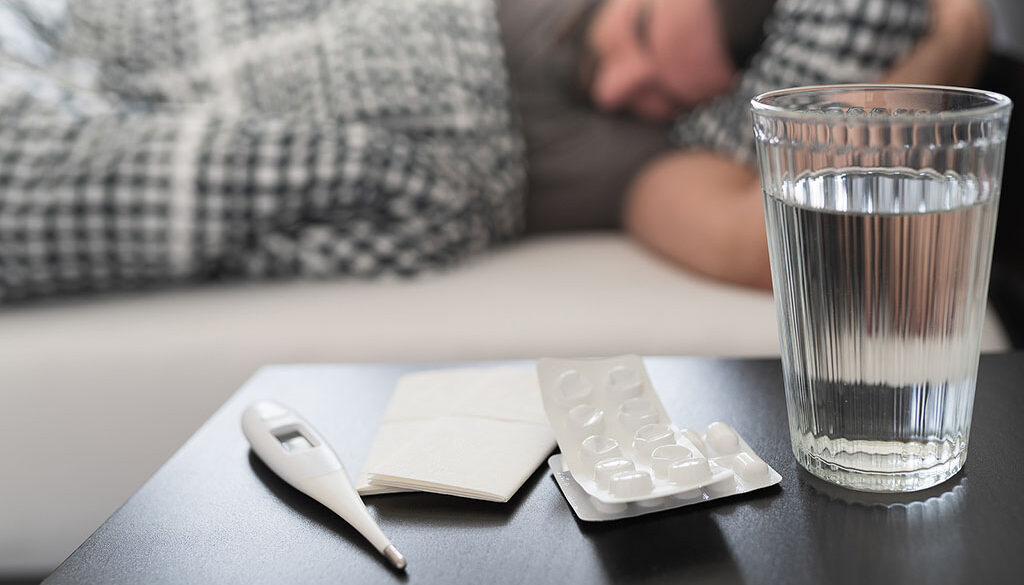3 Tips To Survive Flu Season By Preventing Flu Dehydration
Fall and winter are prime flu seasons, and if you’ve got it, you may be wondering how to feel less miserable as you recover. One of the best things you can do to feel better when you have the flu is to prevent flu dehydration.
Let’s talk about why the flu makes you dehydrated, signs of dehydration to be on the lookout for, and how to prevent flu dehydration from happening.
Why Does the Flu Make You Dehydrated?
When you lose more fluids than you take in, you become dehydrated. Though flu symptoms may vary, it’s possible to experience diarrhea, vomiting, and fever as a result of the flu – a cocktail of symptoms that create the perfect storm for serious fluid loss that leads to dehydration.
Signs of Flu Dehydration: How Do I Know If I’m Drinking Enough Fluids?
You may have heard the idea that by the time you feel thirsty, you’re already dehydrated. That’s why you can’t always rely on thirst as an indicator to drink more liquids.
Extreme thirst is just one sign of getting insufficient fluids. Other signs and symptoms of dehydration include:
- Infrequent urination or dark-colored urine
- Dizziness or lightheadedness
- Dry mouth/chapped lips
- Confusion
- Fatigue
- Headache
3 Tips to Prevent Flu Dehydration
1. Stay Healthy to Avoid Getting the Flu
It may sound obvious, but the first and best way to prevent flu dehydration is to avoid getting the flu in the first place, if you can.
One of the most effective ways to ward off the flu is to wash your hands thoroughly and frequently with soap and warm water. Other tips for keeping the flu at bay include:
- Getting a flu shot
- Avoiding others who are sick
- Staying home from work if you feel like you’re coming down with the flu
- Avoiding large crowds
- Being proactive about keeping germs from spreading. (And if you’re worried that getting a flu shot will make you ill – don’t be. The flu shot does not cause the flu.)
2. Drink More Fluids
Secondly, if you do get the flu, you can prevent or reverse mild or moderate dehydration by drinking more fluids as soon as you start feeling unwell.
3. Drink the Right Kind of Fluids
And thirdly, preventing dehydration when you’re ill requires drinking not just any fluids, but the right kind of fluids.
What Should You Drink When You Have the Flu?
Water should be at the top of your list. Drinks with electrolytes can help replace minerals you’ve lost during your illness, and warm, clear broths are also beneficial, as they contain vitamins and electrolytes that help with rehydration. Foods that contain lots of water, such as certain citrus fruits, and vegetables like tomatoes, cucumbers and zucchini, may also help.
Beverages to avoid include alcohol and drinks high in sugar. You also want to stay away from coffee and other caffeinated beverages, though decaf chamomile, ginger or mint teas may help you rehydrate and feel better.
If You Have Questions About the Flu, We’re Here to Help!
If you have questions about flu vaccines, flu symptoms, what to do if you have the flu, or other flu-related concerns, let us be your guide.
We offer flu shots and vaccinations to reduce your risk of getting the flu, and if you do get the flu, we can provide the information and help you need to get on the road to recovery
Be ready for flu season by scheduling an appointment for a vaccination today.
:::::::::::::::::::::::::::::::::::::::::::::::::::::::::::::::::::::::::::::::::::::::::::::::::::::::::::::::::::::::::::::::::::::::::::::::::
Sources:
Cleveland Clinic, “Rebalance, Replenish: 4 Sources of Electrolytes,” https://health.clevelandclinic.org/best-electrolyte-sources
Mayo Clinic, “Dehydration,” https://www.mayoclinic.org/diseases-conditions/dehydration/symptoms-causes/syc-20354086
MercyHealth, “Hydration During the Flu,” https://blog.mercy.com/hydration-during-the-flu/
:::::::::::::::::::::::::::::::::::::::::::::::::::::::::::::::::::::::::::::::::::::::::::::::::::::::::::::::::::::::::::::::::::::::::::::::::
The content within this article and others on this website is only for educational purposes and should not be considered as medical advice. For any questions or concerns, please consult with your healthcare provider.




